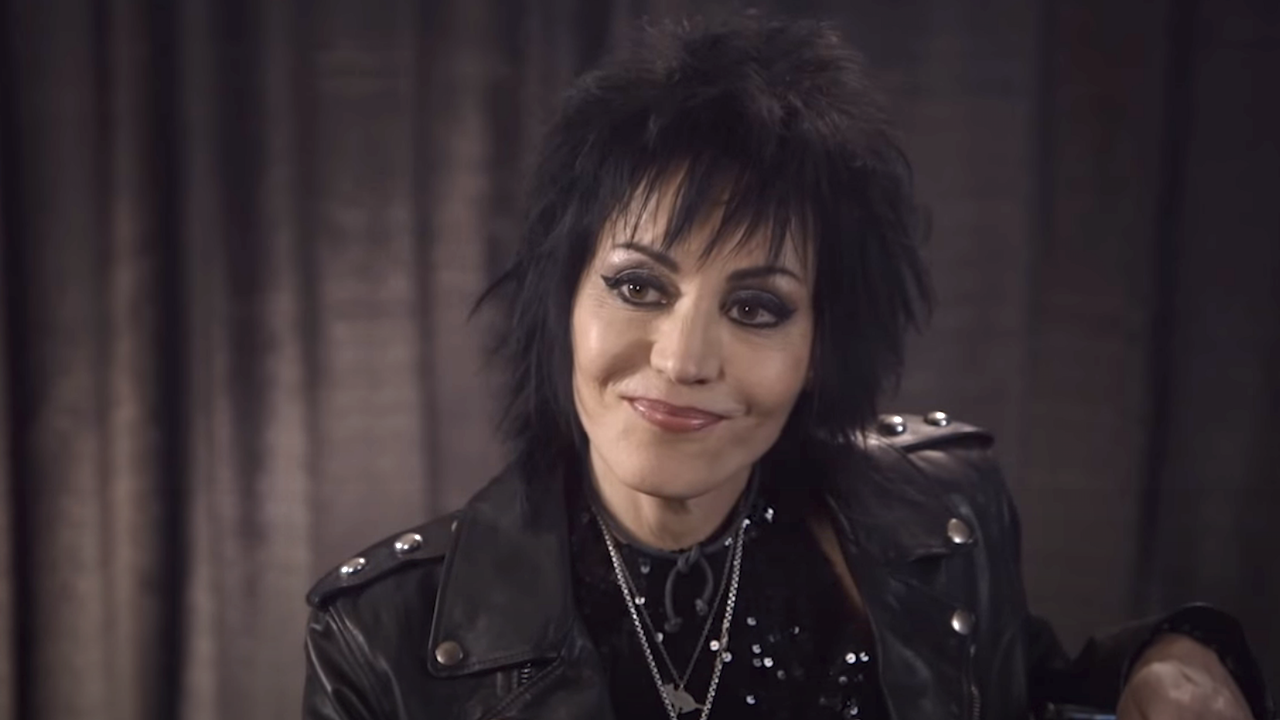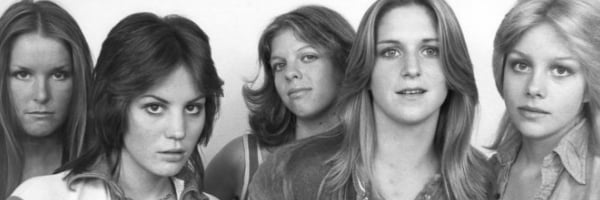Sundance Interview: Joan Jett

Your Daily Blend of Entertainment News
You are now subscribed
Your newsletter sign-up was successful
I am at a film festival, and I got to interview Joan Jett. The logic of this is obvious, given that Jett is the central character in The Runaways, the hot ticket biopic in which Kristen Stewart plays Jett as one of the founding members of the 1970s all-girl punk group. Still, when you've spent days doing interviews with filmmakers and actors with the polished Hollywood thing going on, it's a jolt and a delight to talk to someone like Jett, who still sports the black clothes, shaggy mane and dark eyeliner that defined her look at the height of her rock and roll fame.
Just a few hours before The Runaways premiered on Sunday, Jett talked to me and a few other journalists about how she decided to throw her support behind the film, the similarities between her and Stewart, and exactly how difficult it was to be a girl doing rock and roll in the 70s (answer: very difficult). Jett's honesty and decades of experience in the music industry made for a totally, totally fascinating interview. Check out what she had to say below.
How did the project start with you?
It was actually a long process. it started with Cherie Currie's book- she had written a book about her life in The Runaways and some things that happened to her aftewards. Kenny Laguna was trying to help her get it published. I think this was his idea of getting The Runaways into the Rock and Roll Hall of Fame. I'm not sure of the exact details, but it came across the Linson's attention [producers Art and John Linson], and they brought Floria on board to write the screenplay. At that point I guess I started to take it seriously, and think about, was I into it? There's great people behind it, they've got quite a track record, and I would like to see The Runaways done justice because it's something that means so much to me.
What was it like seeing Kristen Stewart play you?
I think she's a really real person. She's authentic. She cared about it, it wasn't just a gig. She cut off her hair, she really immersed herself in it. I don't mean to put words in her mouth, but what I get is she feels she has to do it justice. She knows The Runaways have fans, she knows I have fans, and she was concerned about being authentic. I found her wonderful to be around. We got along great. It's really scary-- when you see us together physically, the energy is so similar. The way we move, the way our hands move and our hair, the way we talk, we start and don't finish sentences. It's really bizarre, but in a great way. When you see Kristen singing, that's really her singing. Same thing for Dakota and Cherie. I think they did an incredible job. I was very proud.
Had people approached you about making a movie before?
Your Daily Blend of Entertainment News
No not in this sense. Now I think people see that it's an engaging story, but all along The Runaways were dismissed except for the people who were fans and maybe saw them or understood what it meant and what it was about. I know music is subjective, I know everyone's not going to like exactly what we do. It's more about breaking down barriers and boundaries. I was told as a 5-year-old by my parents that I could be anything I wanted, and I took it to heart. I wanted to be an astronaut, an archaeologist, all sorts of things before I got to school, I was in chorus class, I was in drama. You go from Donny Osmond to rock and roll, oh my god I want to make those sounds. Mom and Dad, can I have a guitar for Christmas? They get it for you. Now I've got to learn this thing, so you play to your records and figure it out. Then my family moved to California so I could actually make this thing happen.
So they supported you as an artist even at that age?
Actually my parents separated at that point, so it might have been harder if my father knew I was going into Hollywood at that time. He might not have been as supportive as my mother, but my mother was supportive. This wasn't about rebelling against my family; my family and I get along great. It wasn't about rebelling against school; I loved school, I was a great student. It was more about rebelling against what people tell you you can do. I'm a good person, I'm not hurting anybody, I'm trying to make music. What's the big deal? Being told you can't play rock and roll. I'm trying to figure out, what does that mean? You're saying girls can't master the instruments? What you're saying is socially, girls aren't allowed to play rock and roll because it's sexual. Think of the Sticky Fingers cover, or Robert Plant those stances with him with his shirt open and the microphone. Or singles like "Whole Lotta Love." Go back and listen to it and see how dirty that is. I wanted to do that. It wasn't all just about sex, it was just about owning who you were. It was everybody else who started focusing on that.

A lot of people cite The Runaways as inspiration, but there's never been another group like it. Why were The Runaways so singular?
I think there have been a lot of women out there doing it, they just haven't-- the Runaways didn't get a lot of recognition at the time, certainly not in America. Everyone looks back and reflects and says, oh yeah, I see the influence now. A lot of girl bands in the 90s came real close to breaking through, and there are all-girl bands in every town. When we played on the Warped Tour in 2006, I met people in every city, and they're good. I think people are threatened. I'm trying to figure out what that threat is.
The second thing is, I think girls live a little more in their self-esteem. When people are mean-- they're mean to everyone, men and women, they shoot down your dreams. No matter who you are, once you break the mold, you're doing something different and trying to follow your dreams, they sort of demean you. They make you feel bad about following your dreams. For women and girls especially, who are developing, trying to figure out who they are, being told you're a cunt, you're a dyke, you're a slut, you're a whore-- because you're playing a guitar? It's ridiculous. I think that a lot of people, a lot of women might just say after a while, maybe getting spit on, yelled at doing shows, oeople saying things, giggling, laughing at you, bands not giving you sound checks because you're a girl. They'll go, I'm gonna do something else, it's not worth it. For me, I threw in my lot at 16. This was what it was about until I was absolutely forced to take another course, and that never really happened.
Do you think passion for music has diminished since the time of The Runaways?
I think the whole concept of rock and roll-- I'm wondering what it means anymore. The press has taken the word "rock" and destroyed it. Food rocks. Clothes rock. Pop stars rock. No, pop stars pop, rock stars rock. It means nothing, so you might as well just stop using it in context with music. I think there's a lot of people out there who still have it, but they're the ones doing it on the scene. They're the ones in the basements, in the clubs, toiling the way you should be doing it. That stuff is face to face You can use the internet and the tech media to get the word out, but that shouldn't be the main thing. You've got to get your ass out on the road, play all the clubs-- yes, it's hard work. That's what it is, it's work.
For more of our Sundance 2010 coverage, click here.
Staff Writer at CinemaBlend

